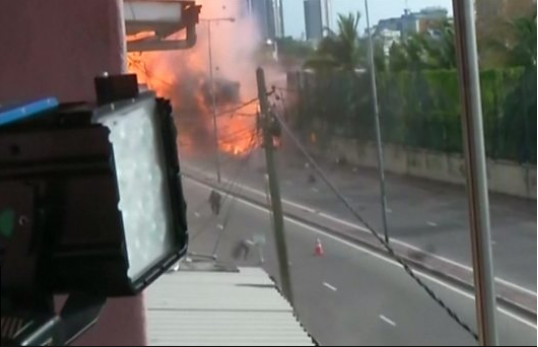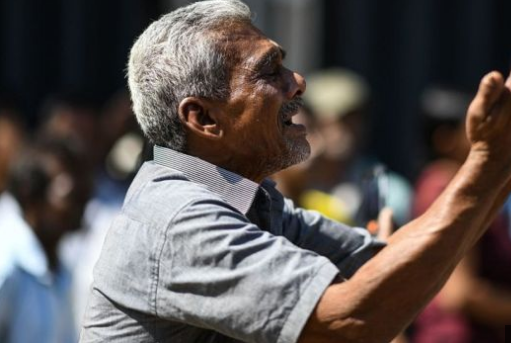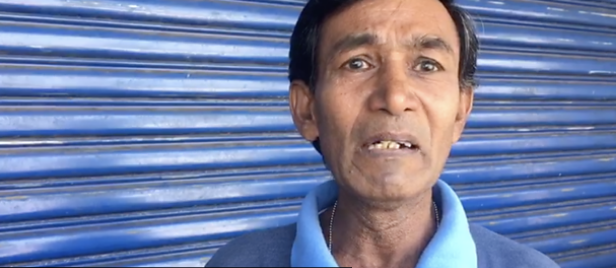The government has blamed a little-known local jihadist group,
National Thowheed Jamath, although no-one has yet admitted carrying out the
bombings.
National Thowheed Jamath, although no-one has yet admitted carrying out the
bombings.
Police arrested 24 people in a series of raids and the
president’s office declared a state of national emergency.
president’s office declared a state of national emergency.
The emergency declaration, which comes into effect from midnight
(18:30 GMT) on Monday, will give police and military extensive powers to detain
and interrogate suspects without court orders.
(18:30 GMT) on Monday, will give police and military extensive powers to detain
and interrogate suspects without court orders.
OnMonday, another blast rocked a street near a church in the capital, Colombo.
Police were attempting to defuse explosives in a vehicle used by the attackers
when it blew up. It is not yet known if anyone was hurt.
Police were attempting to defuse explosives in a vehicle used by the attackers
when it blew up. It is not yet known if anyone was hurt.
Sri Lankan authorities were warned about a bomb threat from
National Thowheed Jamath a full two weeks before the attacks, cabinet spokesman
Rajitha Senaratne said at a press conference.
National Thowheed Jamath a full two weeks before the attacks, cabinet spokesman
Rajitha Senaratne said at a press conference.
He said that the warnings were not passed on to the Prime Minister,
Ranil Wickremesinghe, or his cabinet. Mr Wickremesinghe acknowledged that
security services had been “aware of information” but had not acted
on the information.
“They were talking about isolated, one or two incidents.
Not like this,” he said.
Not like this,” he said.
He said “all important departments of the police” were
informed about the warning, but acknowledged that no action was taken.
informed about the warning, but acknowledged that no action was taken.
Suspicion of
international support
Mr Senaratne said that authorities believed the bombers hadinternational support. “We do not believe these attacks were carried out
by a group of people who were confined to this country,” he said, adding:
“There was an international network without which these attacks could not
have succeeded.”
by a group of people who were confined to this country,” he said, adding:
“There was an international network without which these attacks could not
have succeeded.”
“The intelligence reports [indicate] that foreign terrorist
organisations are behind the local terrorists. Therefore, the president is to
seek the assistance of the foreign countries,” his office said.
organisations are behind the local terrorists. Therefore, the president is to
seek the assistance of the foreign countries,” his office said.
Sri Lanka’s National Security Council said a “conditional
state of emergency” from midnight would target “terrorism” and
would not limit freedom of expression.
state of emergency” from midnight would target “terrorism” and
would not limit freedom of expression.
In another development, the US State Department issued revised
travel advice urging greater caution, adding, “Terrorist groups continue
plotting possible attacks in Sri Lanka.”
travel advice urging greater caution, adding, “Terrorist groups continue
plotting possible attacks in Sri Lanka.”
How did the attacks
unfold?
Three churches in Negombo, Batticaloa and Colombo’s Kochchikade
district were targeted during Easter services. Blasts also rocked the
Shangri-La, Kingsbury and Cinnamon Grand hotels in the country’s capital.
district were targeted during Easter services. Blasts also rocked the
Shangri-La, Kingsbury and Cinnamon Grand hotels in the country’s capital.
Police did not release a breakdown of how many people were
killed and wounded at each location.
killed and wounded at each location.
All the
attacks were carried out by suicide bombers, officials said.
attacks were carried out by suicide bombers, officials said.
Police then carried out raids on two addresses and there wereexplosions at both. One was in Dehiwala, southern Colombo, and the other was
near the Colombo district of Dematagoda in which three officers were killed.
near the Colombo district of Dematagoda in which three officers were killed.
An
improvised explosive device – a 6ft-long [1.8m] plastic pipe packed with
explosives – was also found and defused near the airport in Colombo.
improvised explosive device – a 6ft-long [1.8m] plastic pipe packed with
explosives – was also found and defused near the airport in Colombo.
What do we know
about the attackers?
National Thowheed Jamath was later named by a government
spokesman as the main suspect.
spokesman as the main suspect.
The group
has no history of large-scale attacks but came to prominence last year when it
was blamed for damaging Buddhist statues.
has no history of large-scale attacks but came to prominence last year when it
was blamed for damaging Buddhist statues.
Addressing reports that officials had had prior intelligence of
forthcoming attacks, Mr Wickremesinghe said: “We must look into why
adequate precautions were not taken. Neither I nor the ministers were kept
informed.”
forthcoming attacks, Mr Wickremesinghe said: “We must look into why
adequate precautions were not taken. Neither I nor the ministers were kept
informed.”
A deep
wound to the nation
Anbarasan Ethirajan, BBC News,
Colombo
Colombo
Very few here expected these massive attacks. The co-ordination,
sophistication and timing may indicate international support, but it is not
clear yet if National Thowheed Jamath, if it is indeed responsible, has links
with global jihadist groups.
sophistication and timing may indicate international support, but it is not
clear yet if National Thowheed Jamath, if it is indeed responsible, has links
with global jihadist groups.
It is thought that some Muslim youths in Sri Lanka wereradicalised after clashes last year in Kandy district between the majoritySinhala Buddhists and Muslims. Videos posted on social media showed hardline
Islamists and Sinhala hardliners promoting hatred. But why were the Christians
targeted? They are also a minority in Sri Lanka. Sri Lankan Muslims are baffled
by the attacks, as well as nervous and afraid.
Islamists and Sinhala hardliners promoting hatred. But why were the Christians
targeted? They are also a minority in Sri Lanka. Sri Lankan Muslims are baffled
by the attacks, as well as nervous and afraid.
Sri Lanka has experience of such attacks – suicide bombers were
used by Tamil Tiger rebels during the civil war. But the ruthlessness of the
these new atrocities is a shock, and the number of dead is a deep wound to the
nation, a wound that will take much time to heal.
used by Tamil Tiger rebels during the civil war. But the ruthlessness of the
these new atrocities is a shock, and the number of dead is a deep wound to the
nation, a wound that will take much time to heal.
Who are the victims?
The vast majority of those killed are thought to be Sri Lankan
nationals, including scores of Christians who died at Easter church services.
nationals, including scores of Christians who died at Easter church services.
The ministry of foreign affairs said it had identified 31
foreign nationals among the dead, with 14 unaccounted for. The death toll
included at least eight British citizens and at least eight citizens of India.
foreign nationals among the dead, with 14 unaccounted for. The death toll
included at least eight British citizens and at least eight citizens of India.
They include three of thechildren of Danish billionaire Anders Holch Povlsen, a family
spokesman confirmed to the BBC. Mr Povlsen owns the Bestseller clothing chain
and holds a majority stake in clothing giant Asos.
spokesman confirmed to the BBC. Mr Povlsen owns the Bestseller clothing chain
and holds a majority stake in clothing giant Asos.
British lawyer Anita Nicholson died alongside her two children,
Alex, 14, and Annabel, 11, when a suicide bomber detonated a device in the
breakfast queue at the Shangri-La hotel in Colombo.
Alex, 14, and Annabel, 11, when a suicide bomber detonated a device in the
breakfast queue at the Shangri-La hotel in Colombo.
“Anita was a wonderful, perfect wife and a brilliant,
loving and inspirational mother to our two wonderful children … Alex and
Annabel were the most amazing, intelligent, talented and thoughtful children
and Anita and I were immensely proud of them both and looking forward to seeing
them develop into adulthood.”
loving and inspirational mother to our two wonderful children … Alex and
Annabel were the most amazing, intelligent, talented and thoughtful children
and Anita and I were immensely proud of them both and looking forward to seeing
them develop into adulthood.”






